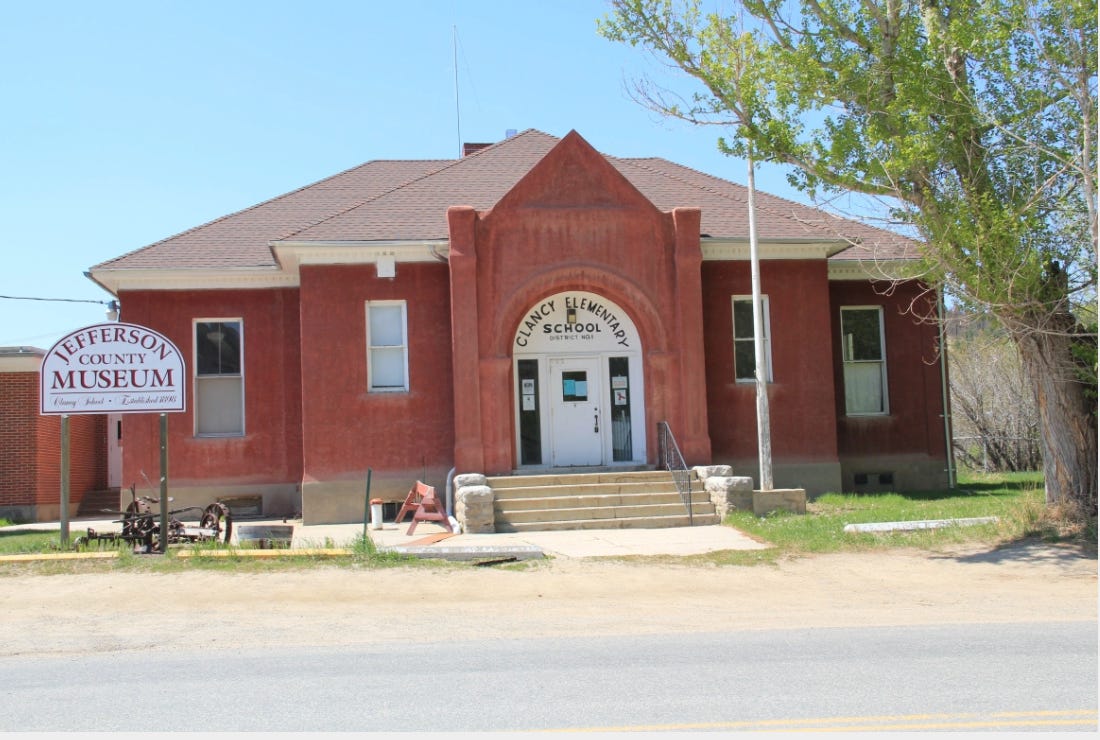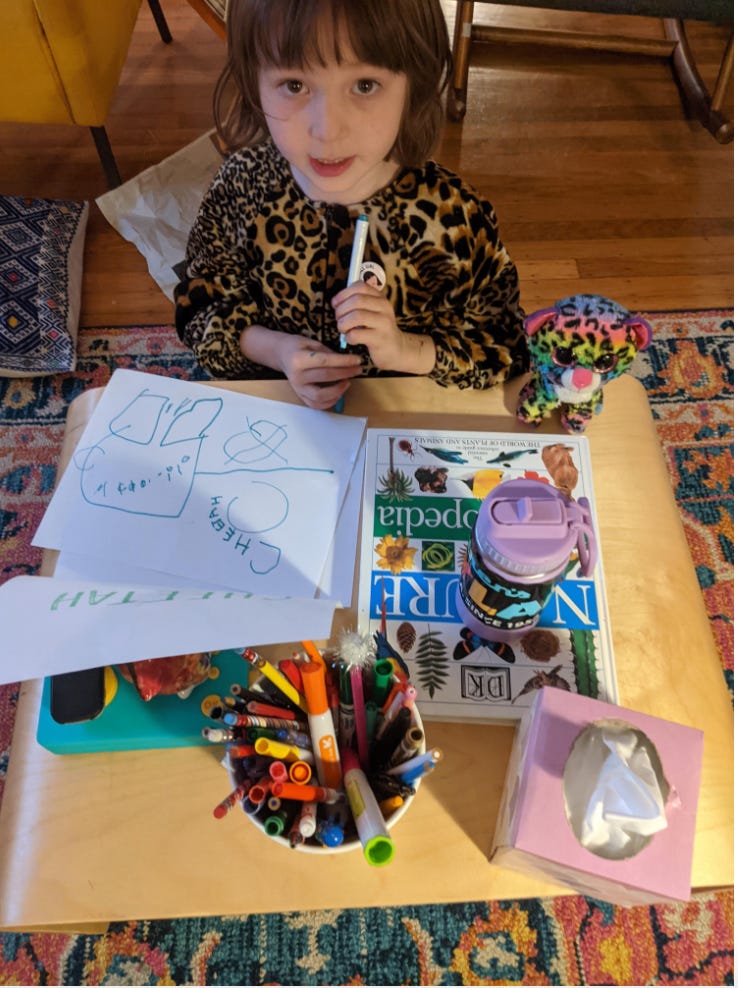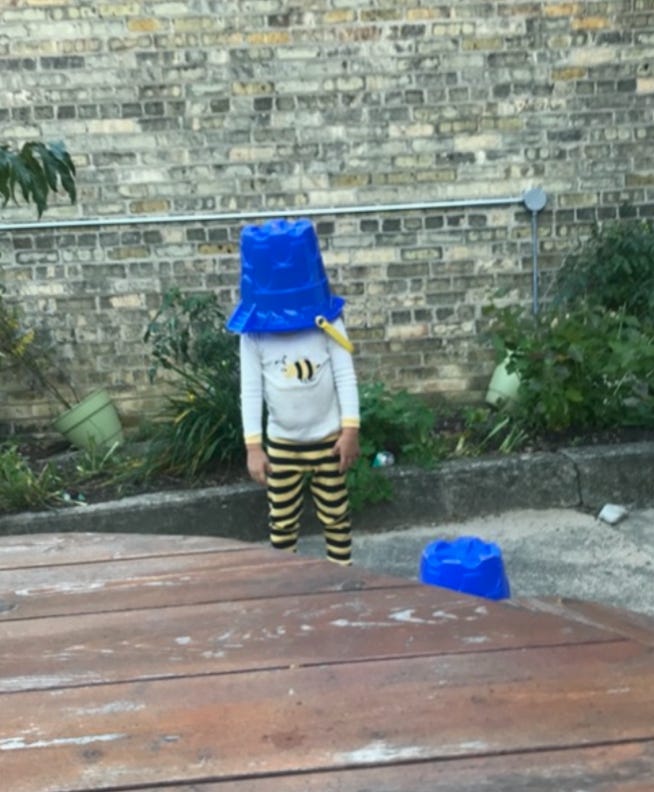Teachers, Parents and Cans Full of Snakes (Part One)
Two friends try to make sense of this whole school reopening debate
Note: I made a new friend in 2020! Her name is Sarah Wheeler. and she’s so rad. Who is she? Oh goodness… She’s a white mom in Oakland trying to be thoughtful about justice and equity. She is a teacher (in every sense of the word) as well as a Licensed Educational Psychologist who helps other teachers and parents build the most welcoming possible spaces for all students. She is a writer whose newsletter (The Inclusive Educator) is a must-read if you care about human beings and how they relate to each other. She is a hall-of-fame-level funny/wise text partner. She is a human being who has sent me multiple pictures of potato chips.
What you’ll see below is the first half of an exchange she and I had with one another about the school reopening debate (and, more accurately, about the role of white parents in that debate). We’ve got a lot we’re trying to process! And we come at it from slightly different places! We get so into it, in fact, that we didn’t talk about Taylor Swift or Tacko Fall once (extremely out of character for us). I hope it’s helpful for your processing as well, and I very, very, very much hope you read the second half (which is already live over at Sarah’s newsletter).

Hey Garrett,
I lay awake at 4 o'clock this morning, trying to keep my sleeping toddler from crushing my windpipe with her elbow and thinking about schools. My son Max, as you know, starts Kindergarten in the fall. In my little parental heart, I want, more than anything, to walk him down the block to school in August (in California, the school year seems to start earlier every year), give him a big, meaningful hug, and watch him scamper off into a classroom of real-live-five-year-olds, without a “Zoom circle time” in sight. But, my friend, I am almost sick to my stomach with the tenor of the debate over school reopenings.
In this country, every one of us has spent years of our lives in schools. Many of us have kids enrolled in one. But someone who doesn’t, at this moment, work in a school offering advice, or in some cases, condemnation, about what schools and teachers should and shouldn’t be doing, makes as much sense to me as eating in a restaurant and thinking you could run one. Just because you see the finished product does not mean you understand the process. Even those who are not blaming teachers are talking, somewhat casually, about changes that anyone who has ever been part of a school system can tell you are incredibly difficult, if not impossible to make, with the insufficient resources that many of our nation’s schools are given.
When I discovered last week that I needed a document camera, a $30 purchase, to teach my graduate seminar this semester, I appealed to the director of my program. The response was evasive. Couldn’t I call IT? Wasn’t there a fund for things like that, which had, come to think of it, almost certainly been used up months ago? What if I drove 45 minutes each way to a campus I wasn’t supposed to be on, and taught in an empty classroom that had one? After a 15-minute conversation with an IT guy who had nothing to offer me but was surprisingly moved by my plea, I realized the only way I was going to get the camera was to buy it myself. I have worked in schools for the better part of 20 years. I knew it wouldn’t be easy.
Later that week, the CEO of the start-up I contract for asked if I needed a piece of equipment for my home office. “Yes!” I replied, bracing myself for extensive paperwork, “how do I get one?!!!” She asked me to purchase the one I wanted and tell her how much I owed her. Not until working, for the first time, in a for-profit company, did I know what the other side was like. I told this story to a friend of mine with an MBA, also sharing my salaries for both jobs. “Ooof!” she said. “I knew teaching was bad, but I didn’t know it was THAT BAD!”
I have been a volunteer, an aide, a special education teacher, a school psychologist, an educational researcher, a teacher-consultant, an observer, and a professor and supervisor in a teacher education program. Compared to many of my colleagues, I still know diddly squat. But I know enough to know that I believe teachers when they say they can't get it done with what they're being given. I once worked at a public school (now open to in-person instruction), where every teacher had an annual budget for classroom expenses that they could use at their own discretion. And I worked with kids in another school (not open), not 3 blocks away, where a first-year teacher had to set up a GoFundMe page for basic classroom supplies. I interned at a public school (open) where the annual fundraiser auction was held, complete with flutes of champagne and Stephen Tyler-autographed guitars, at a country club. At another public school (open), that raised millions of dollars for a few thousand students each year, and where on Teacher Appreciation day I received a $300 gift bag. I also consulted at a public school (not open) where a first-grader I adored had to sit in his own shit in the office for over an hour because there was no nurse and his mother, who worked nights and slept days, could not be reached. All of these schools are within a 30-mile radius of one another. The private school down the street from me (open) has its own COVID testing van and a student-teacher ratio (even before COVID) of 8 to 1. It costs $30,000 a year. The public school down the street from me (not open) had to cut its paltry budget last year even though it received more students, and has a ratio of 22 to 1, which is actually good for California public schools.
According to one source, my city, “along with the rest of California, ranks in the bottom fifth of per-pupil spending, despite being richer than all but a handful of countries in the world.” You can do a lot with $30,000. We can bash the public school system, and districts like mine, which are so historically mismanaged that they have been under multiple high-level investigations. We’d be right, though I’d argue that asking these schools to do a great job with what we’ve given them is a plan that would never, ever pass muster in the business world.
But to criticize teachers is bordering on insanity. Everywhere you look, health care is failing Americans. People are not being tested, vaccinated, treated. People have died in hotel rooms. Yet I have not read one single article blaming this problem on doctors. That’s because it is, so obviously, a systemic problem, and whether you believe it was brought on in some roundabout way by Obamacare or, more accurately, by years of privatization, racism, classicism, and neglect, you do not think that if the doctors at your local hospital just worked harder or demanded less (some are sitting comfortably in their telehealth offices, vaccinated, by the way, not to hate but just, it's true), it would not be a problem anymore.
The teachers at the schools who are open, the schools I mentioned above, are not more flexible, or stronger-willed, or more dedicated, or more willing to put themselves in danger for the sake of their students. They just happen to work in schools where the majority of students are wealthy and white. And here, dear Bucks, is where I need the context you so coherently provide so I can settle down and get some sleep. How did we get here? And how do so many educated, powerful people still not understand, or want to understand, the incredible inequities in our education system, which are the greatest barrier to school reopenings and which we ourselves seem to have created?
Here's a picture of my son playing "home-schooled Cheetah" an honest-to-god game he just invented.
XO
Wheeler
Sarah!
First off, just from a "credit where credit's due" perspective, even if you hadn't given me any description of that picture, I would have immediately gone "oh, that's a home-schooled cheetah." Well played.
You made such good points and asked such good questions. Because I'm a stinker of a friend, instead of addressing them directly I'm going to complain about my couch for a second.
Here’s how most days start around here. My kids wake us up, slightly earlier than we’d prefer. We gather in the living room, each of us dragging a blanket behind us. In between the yawns and the stretches and my four-year-old’s absurd breakfast orders (one unheated but buttered tortilla served alongside a pile of blueberries), I curse my couch again.
I am so mad at this couch. It was so cool-looking when we bought it— a non-offensive shade of green, mid-century-ish but not in a try-hard way. It looked like the kind of couch that cool people who know how to decorate might own.
The problem is, well, we aren’t cool people who know how to decorate. We are uncool people who kill plants. Also, our living room is weird (it’s actually more of a glorified hallway between the kitchen and dining room), so the couch doesn’t quite work. Oh and all the tasteful little buttons on the cushions keep coming off. But mostly, after years of attrition, our cats have finally won The Battle of Scratching The Heck Out of That Couch and so now the legs all look super crappy.
But the worst indignity of all isn't just that it's an increasingly junky couch but that it's always there, literally just sitting in my living room waiting to mock me every morning.
Damn that couch. Every morning for nearly a year now. Damn that couch.
Ok, back to the matter at hand. We are a nation of frayed ends, aren't we? There have always been millions of Americans-- disproportionately Black, Brown and Indigenous folks- who have never been given any reason to believe that this country would work for them. What's changed over the last year is that comfortable white folks are also getting a front-row seat to all the ways that America's social contract is one of those novelty cans of nuts with the snakes that jump out at you. You want to be able to work AND raise a kid? Ha! You want an easy-to-use website where your parents can sign up for a vaccine? Ha! You expect that when a winter storm whips through your state that the power and water won't go out for a week? Ha! You'd like to live in a country where the burden for holding it all together doesn't fall mostly (again) onto women? Ha! Snakes! Snakes! Snakes! Snakes!
This is all to say: when you're frayed, when you're stressed, when your country is letting you down… it makes sense for you to lash out at the first thing you see. And because we live in a country that rewards incrimination and blame rather than problem-solving and cooperation, the thing we know how to do in our moments of stress-xaustion isn't to ask for help with what we really need, it's to rage!
Sarah, I guess what I'm saying here is that I'm not really mad at my couch. I'm tired and scared and I've spent this whole year in the same house and I want out. I wish I wasn’t red-eyed and overwhelmed. I wish I had more time and energy so that house wasn’t full of clutter and scuffed edges. I’m scared that if I don’t have the wherewithal to figure out what to do about this couch, it means I’m letting down all sorts of other (actually consequential) aspects of my life.
And goodness knows it’s not an apples-to-apples comparison, but you likely get the point I’m making here. I have so many exhausted friends-- people I love and respect and who (because they have good taste in newsletters) are probably reading this right now. And they (like you and I) are barely holding it together with this whole pandemic-parenting thing. So many are feeling hopeless as their kids struggle in profound and heartbreaking ways. So many (again, particularly women, because... patriarchy) are up all night working because they spent the whole day managing “school.” They’re furious and at their wit’s ends.
Every parent deserves to be heard right now. Yes, even ones that hold societal privilege. They deserve to have somebody, somewhere, both care about and actually meaningfully respond to how they’re doing right now. They deserve a government that gives themselves and their families the social safety net we all deserve. They deserve a New Zealand-style Covid response rather than a Mordor-style Covid response.
The problem is, in absence of all that, all we’re left with is helplessness and rage. And when we hollow out society to that point, of COURSE that all gets funneled towards the scapegoat next door. We yell at school districts and teacher’s unions and teachers in general because they’re what we see in front of us (you know, like me and my couch). School districts that remain closed are literally one of the only institutions in our life that are attempting to act with the gravity the pandemic requires. The problem is, in a world where nothing else is working for the common good, those efforts stand out like a sore thumb. Hence, the rage.
So hell yeah to all your points. Teachers don’t deserve this vitriol. But parents DO deserve to have their government (and neighbors) give a hoot about how much they’re struggling. And I may be naive, but I believe that there’s a different version of a conversation out there where we can hold both of these rights in our hands at once. Does this ring true for you or am I just talking nonsense? And if so, what would your vision of that different conversation look like?
Love you; grateful for you,
Garrett
P.S. You probably want to see a picture of the couch but I don’t want to give that piece of furniture the satisfaction or publicity. Instead you get this picture of my daughter with a bucket on her head.
Head over to Sarah’s newsletter to read Part II….
Also: Thanks, as always, for supporting The Barnraisers Project. Amongst many other projects, this newsletter wouldn’t exist without your support.
Ok, NOW it’s time for the bucket picture.






Love this conversation. I think you also can't overstate the easier job that private schools generally have than public schools. They filter out kids and families in all sorts of ways: overwhelmed financially? Not welcome. Kid misbehaves too much? Not welcome. Parents don't demonstrate their own ability to carry a heavy amount of the education of their kids, by not appearing educated in the application? Not welcome. It's not merely that private schools are able to spend more per kid, which is generally true but not always as big a difference as you might guess. It's that if private schools had to actually take the same kids that public schools take, their teachers, students and administrators would be overwhelmed with their needs.
I also hate my couch! I used to love it because it was a hand-me-down from a family that had had three boys and so it didn't matter what happened to it because it had been through everything. But then we got a dog and she's always spread out on it, which means being covered in fur when you sit down, and she also keeps ripping out the stuffing so it's not as comfortable.
This was amazing and I am so glad to be introduced to Sarah Wheeler. I particularly liked the Part II section on her newsletter. I am not a teacher but I work in textbook publishing, which gives me a lot of opinions about curriculum development and the kinds of pressures put on teachers to abandon deeper learning in favor of test-driven lessons. It feels like our society does everything we can to make teaching, especially in public school, an impossible job, and then looks for ways to blame teachers for the failures we've baked into the system.